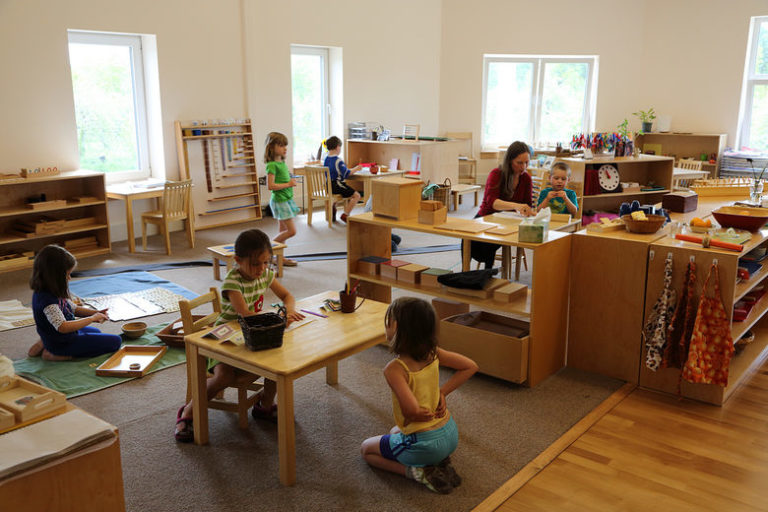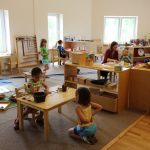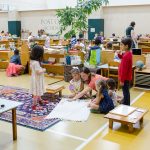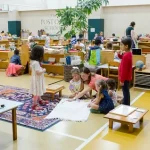
If you’re a parent wondering how to give your child the best possible start in life, you’ve probably come across Montessori education. Specifically, the Primary Montessori classroom, which welcomes children aged 3 to 6, has earned a reputation for creating confident, capable learners. But what really makes it so special? How does it prepare your child not just for school, but for lifelong success?
In this blog, we’re diving into what actually happens inside a Montessori classroom and why it can set your child up for growth, independence, and long-term happiness.
The Power of Independence from an Early Age
One of the most noticeable things in a Montessori classroom is how independent the children are. From the moment they walk into the room, everything is designed to give them freedom within limits. The chairs and tables are child-sized, the materials are easy to access, and the routine encourages them to take charge of their day.
Children choose activities based on their interests, learn how to clean up after themselves, and even serve their own snacks. This may sound simple, but these small tasks build a sense of responsibility. Children quickly learn that they are capable of doing things on their own, which boosts confidence early in life.
Hands-On Learning Leads to Real Understanding
Forget boring worksheets. Montessori classrooms are famous for their hands-on learning approach. Everything from math to language to science is taught using special materials that children can touch, move, and manipulate.
This kind of learning is important because young children learn best by doing. Instead of just memorizing information, they truly understand it. For example, in math, children don’t just count on paper—they work with colorful beads and number rods, which helps them grasp big concepts like addition and subtraction in a natural, stress-free way.
Building Focus and Concentration
Many parents are surprised to see how calm and focused Montessori classrooms are. There’s no loud chaos or constant interruptions. Instead, children are given long stretches of uninterrupted work time. This quiet, respectful environment helps children develop the ability to concentrate on tasks without getting easily distracted.
Why is this so important? Because focus is a life skill. In the future, whether your child is studying for exams or working in a busy office, the ability to concentrate will help them succeed in all areas of life.
Mixed-Age Learning Builds Leadership Skills
Another unique feature of Montessori classrooms is the mixed-age setup. Children between the ages of three and six work in the same room. This approach benefits everyone. Younger children learn by observing older children, while older children get the chance to be leaders and helpers.
This dynamic teaches kids to be more patient, kind, and helpful. It also boosts their confidence as they realize they can teach others. Leadership, teamwork, and empathy are all natural outcomes of this structure.
These social skills are just as important as academics, and they help your child thrive in school, at home, and in future workplaces.
Montessori Education Encourages a Love for Learning
If there’s one thing Montessori education is famous for, it’s creating children who actually enjoy learning. Instead of forcing kids to follow a strict curriculum, Montessori classrooms give them freedom to explore topics that genuinely interest them.
This doesn’t mean they don’t learn important subjects like math or reading they absolutely do. But they also have time to dive deeper into areas they’re curious about, whether it’s science, geography, or art.
This freedom creates motivated learners who see education as something exciting, not boring. Children who love learning are more likely to perform well in school and stay curious throughout life.
Real-World Skills That Go Beyond the Classroom
Montessori education isn’t just about academics. It’s about raising well-rounded, capable human beings. That’s why Montessori children also develop practical life skills that help them outside of school.
From learning to tie their own shoes to preparing simple snacks, Montessori kids get hands-on experience with everyday tasks. These experiences teach them responsibility, organization, and the satisfaction of being able to take care of themselves.
These real-world skills lead to more confident, independent children who are ready to handle challenges both in school and in life.
Emotional Growth and Self-Regulation
Montessori classrooms are carefully designed to encourage peace, respect, and positive behavior. Children are taught to respect each other’s work, use calm voices, and resolve conflicts peacefully. This positive environment helps children develop emotional intelligence and self-regulation from a young age.
Instead of using punishments, Montessori teachers guide children to understand their feelings and make good choices. This focus on emotional growth helps children become more balanced, caring, and self-aware individuals.
Preparing Children for Future Academic Success
Of course, every parent wants their child to do well academically, and Montessori classrooms deliver on this too. Because the learning is hands-on, child-driven, and carefully structured, children often develop strong reading, writing, and math skills before even entering elementary school.
Many studies have shown that Montessori students perform well academically, often surpassing their peers in traditional classrooms in both academic performance and social development.
Final Thoughts:
The Primary Montessori classroom is much more than a place for early learning it’s a foundation for lifelong success. By encouraging independence, building strong social skills, creating focused learners, and fostering a love for knowledge, Montessori education equips children with the tools they need to succeed not just in school, but in every part of life.
When children are respected, empowered, and allowed to grow naturally, they become more confident, motivated, and happy. These are the qualities that lead to success not just on report cards, but in friendships, careers, and personal goals.






